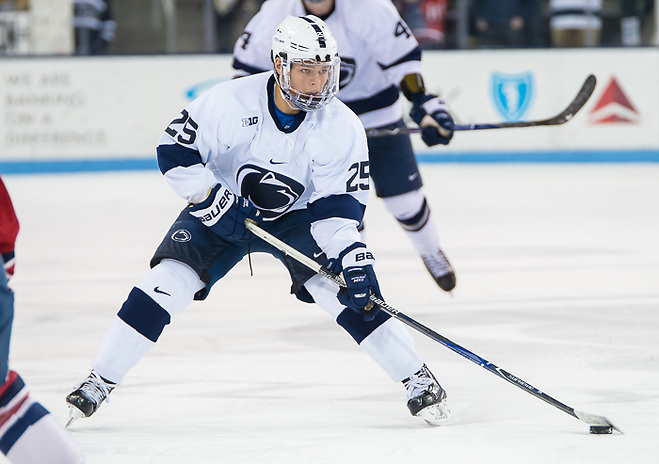
Each week during the season, we look at the big events and big games around Division I men’s college hockey in Tuesday Morning Quarterback.
Paula: Jimmy, last week we began by talking about how well the higher seeds had done in best-of-three series, with the only upset begin Army’s sweep of Mercyhurst.
That seemed to contradict the parity that you and I have been discussing all season. This past weekend, though, there were so many upsets that
In Atlantic Hockey, Niagara swept Air Force, the defending playoff champion for the last two seasons running. In Big Ten hockey, Penn State beat Ohio State in a single-elimination semifinal game. In the ECAC, Brown swept Quinnipiac, snapping the Bobcats’ 20-year streak of playoff series wins. In Hockey East, Boston College upset Providence in three games and Boston University did the same to UMass Lowell in three.
Before last weekend, every one of those winning teams needed to play its way into the NCAA tournament, with Penn State emerging from its game against Ohio State at No. 14 in the PairWise – still very much on the bubble. When I talked to Guy Gadowsky today, he said that the NCAA tournament was the furthest thing from his team’s mind when the Nittany Lions traveled to Columbus. When I covered Ferris State as part of the CCHA, Bob Daniels said that every year, the Bulldogs’ main goal was to win a conference playoff championship.
I guess I have two questions. What do you make of the play last weekend, and how much do you think each team is driven by NCAA hopes as opposed to conference titles at this point in the season?
Jim: You pose two great questions.
The one thing that the difference in the two weekends shows, possibly, is the difference between the bottom and top of each league.
I think in an opening weekend where there are a lot of bottom teams trying to win playoff games, there can be a struggle. But when you then include middle-of-the-pack teams battling the top teams, we see some upsets.
That actually creates a decent argument for the playoff formats of the WCHA and Hockey East, both of which eliminate multiple teams after the regular season. If those teams will struggle to be competitive in the postseason, it is somewhat understandable to simply eliminate them. I have had coaches tell me that they would rather hit the road and recruit instead of playing that playoff series, which is understandable.
That said, I also see the argument to allow college students, who only play 34 games, for the most part, to both play more game and experience a postseason.
As for your question about how coaches coach, I believe every single coach wants a trophy, so I do believe that most just want to win their conference title. Does that mean they ignore the PairWise? Not likely. If you’re in the mix, every coach pays attention. But we all know, the easiest route to the NCAA tournament is winning a title the weekend before.
Paula: You bring up something that I have been advocating for ever since I began covering college hockey – the shortening of the conference playoff field.
I remember when there were 11 teams in the CCHA and the top eight made the playoffs, which seemed like the sensible thing to do. When teams were excluded from postseason play, the race for the last one or two spots that meant playoff participation was as exciting as the competition for the regular-season title which, once upon a time, was also a ticket to the NCAA tournament, as you noted in a TMQ column with Candace Horgan in late February.
I understand the argument for allowing players to play as many games as they can and I know how valuable a playoff experience can be for a developing player, regardless of his team’s chances, but I still favor shortening the field – even with a seven-team league like the Big Ten.
All of this has me looking back 20 years to the 1998-99 season, when first-place Michigan State finished with 47 conference points in 30 league games – and 30 points ahead of last-place Alaska (then Alaska-Fairbanks). In the same season, New Hampshire topped Hockey East with 39 points in 24 regular-season games and last-place Northeastern had 14.
That same year in the WCHA, first-place North Dakota had 50 points in 28 games while last-place Minnesota-Duluth had 12. In the ECAC, first-place Clarkson had 36 points while last-place Union had four. In the Metro Atlantic Athletic Conference – I feel like I have to write out the MAAC, as it was so long ago – first-place Quinnipiac had 46 points and last-place Fairfield had two points. Fairfield now competes in D-III ACHA.
There were also six D-I programs that competed as independents that year: Air Force, Alabama-Huntsville, Army, Mankato State, Nebraska-Omaha and Niagara.
I was thinking for a moment that it’s difficult to imagine such a points differential between first- and last-place teams, but in the WCHA this season, Minnesota State finished with 68 points to Alaska Anchorage’s 11.In the WCHA, the top eight seeds make the conference playoffs, and this year’s standings seem to be an argument for that.
Jim: I, personally, have a difficult time with this argument.
I understand that the lack of parity between the top and bottom teams in leagues is often beyond reproach. But the difference between, say, the top team and ninth-place team is often two games (4-6 points in the modern era, depending on leagues). I do like making the regular season mean something. But I have also come to grips with the argument of many coaches – to me, personally, many of which perennially make their conference postseason – that say they would rather see all teams make the playoffs.
For some teams, particularly the fifth seed in, say, a 12-team league, that extra series can have a major impact on the PairWise. This year, for Dartmouth in the ECAC, the one team that could have impacted, it was a non-starter as the Big Green had basically eliminated themselves without an ECAC tournament win.
Byes, though, in conference playoffs, can make a difference. Reference Ohio State. Maybe Penn State was the better team, but the Buckeyes loss I bet draws attention in the Big Ten and I would not be surprised next year if the semifinals become a best-of-three. No team wants to take a weekend off and then play a hot team in a single-elimination game, right?
Paula: I completely respect the argument that all teams should make the playoffs for a variety of reasons, especially as it impacts the PairWise. In a league with 10 or more teams in which there are a few points separating seedings – especially in the middle of the pack – a bubble PWR team can solidify its situation with an extra series and higher seeds can find themselves in much better positions in the NCAA tournament with the extra series if their leagues are strong, top to bottom. I totally get that.
Then there’s the situation of higher seeds being hurt significantly by losses to lower teams. Of course, teams that should take care of business should do so regardless of who they’re playing, so there’s that.
In regard to your question, no one wants to play a hot team in a single-elimination game, and it wouldn’t surprise me if the Big Ten revisits that in the off-season.
But Notre Dame squeaked by the hottest team in the B1G playoffs in single-elimination action – albeit on a power-play goal resulting from a controversial overtime penalty call – and every team that made it to the Big Ten semifinals faced single elimination, just like every team does in the NCAA tournament. The bye week undoubtedly hurt Ohio State and it shouldn’t have – but that, Jimmy, is another story altogether.
Jim: Well, I don’t know why you think that a week off shouldn’t hurt a team, particularly when that team is in a single-elimination game.
It is difficult to practice in an environment when you aren’t preparing for an opponent. And that’s what that entire week becomes in a bye week. Now, Ohio State wasn’t the only team in that situation, but they were the only team facing a single-elimination game.
If I were a coach, as much as I would like to rehab some late-season injuries in an off week, the most critical thing to me would be playing hockey. Teams lose edge and passions when they sit around and don’t play, in my opinion. And I understand some teams fared fine off a bye week.
But, to me, playoff hockey is difficult enough before you add in an off week for coaches to manage.


